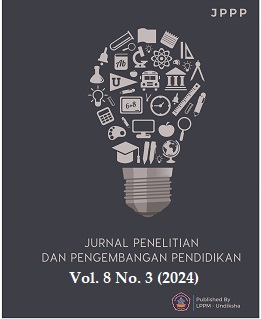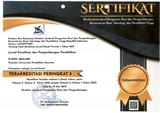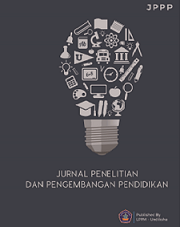The Relationship between Post-Pandemic Organizational Climate and Teacher Performance in Public Elementary Schools
DOI:
https://doi.org/10.23887/jppp.v8i3.76073Keywords:
Teacher Performance, Organizational Climate, PandemicAbstract
The background of this study is the comprehensive changes in social life due to the COVID-19 pandemic outbreak, which is assumed to affect many aspects of the education sector. This study analyses the relationship between two selected variables: organizational climate and teacher performance in public primary schools after the COVID-19 pandemic. This research is a quantitative study with a correlational research design. Data was collected using a closed questionnaire distributed to 128 primary school teacher respondents. The instrument used was a questionnaire sheet. The number of respondents obtained by researchers is determined through cluster sampling techniques, also known as cluster sampling techniques. The results showed a significant and simultaneous relationship between organizational climate and teacher performance in public elementary schools with an extreme category relationship level. Thus, the post-pandemic organizational climate significantly correlates with teacher performance in public primary schools after the COVID-19 pandemic. The results of this study can also be used as a basis for further research to analyze differences in two periods with the same variables.
References
Agung, A. A. G., Sudiarta, I. G. P., & Divayana, D. G. H. (2018). The Quality Evaluation of School Management Model Based on Balinese Local Wisdom using Weighted Product Calculation. Journal of Theoretical and Applied Information Technology. DOI: https://doi.org/10.2991/icirad-17.2017.30
Aidoo, S. O., Agyapong, A., Acquaah, M., & Akomea, S. Y. (2021). The performance implications of strategic responses of SMEs to the covid-19 pandemic: Evidence from an African economy. Africa Journal of Management, 7(1), 74–103. https://doi.org/10.1080/23322373.2021.1878810. DOI: https://doi.org/10.1080/23322373.2021.1878810
Al-Kurdi, O. F., El-Haddadeh, R., & Eldabi, T. (2020). The role of organisational climate in managing knowledge sharing among academics in higher education. International Journal of Information Management, 50(1), 217–227. https://doi.org/10.1016/J.IJINFOMGT.2019.05.018. DOI: https://doi.org/10.1016/j.ijinfomgt.2019.05.018
Alibakhshi, G., Nikdel, F., & Labbafi, A. (2020). Exploring the consequences of teachers’ self-efficacy: a case of teachers of English as a foreign language. Asian-Pacific Journal of Second and Foreign Language Education, 5(1). https://doi.org/10.1186/s40862-020-00102-1. DOI: https://doi.org/10.1186/s40862-020-00102-1
Basmar, E., Iii, C. M. C., & Basmar, E. (2021). Is an Indonesia the right investment environment after Covid-19? Earth and Environmental Science, 737(1), 12021. https://doi.org/10.1088/1755-1315/737/1/012021. DOI: https://doi.org/10.1088/1755-1315/737/1/012021
Bosch, E., Seifried, E., & Spinath, B. (2021). What successful students do: Evidence-based learning activities matter for students’ performance in higher education beyond prior knowledge, motivation, and prior achievement. Learning and Individual Differences, 91(1), 102056. https://doi.org/10.1016/J.LINDIF.2021.102056. DOI: https://doi.org/10.1016/j.lindif.2021.102056
Budiarti, E. M., & Pambudi, B. A. (2022). Pengembangan Diagram Ishikawa Sebagai Upaya Peningkatan Mutu Sekolah. JDMP (Jurnal Dinamika Manajemen Pendidikan, 6(2), 149–160. https://doi.org/10.26740/JDMP.V6N2.P149-160. DOI: https://doi.org/10.26740/jdmp.v6n2.p149-160
Cahaya, A., Yusriadi, Y., & Gheisari, A. (2022). Transformation of the Education Sector during the COVID-19 Pandemic in Indonesia. Education Research International, 22(1). https://doi.org/10.1155/2022/8561759. DOI: https://doi.org/10.1155/2022/8561759
Carvalho, A., Alves, H., & Leitão, J. (2020). What research tells us about leadership styles, digital transformation and performance in state higher education? International Journal of Educational Management, 36(2), 218–232. https://doi.org/10.1108/IJEM-11-2020-0514. DOI: https://doi.org/10.1108/IJEM-11-2020-0514
Dhiu, K. D. (2017). Learning Motivation And Perception Of The Teachers’ Pedagogic Competence And Learning Achievement In Social Science Of Junior High School Students. Journal of Education Technology, 1(1), 6–12. https://doi.org/10.23887/jet.v1i1.10078. DOI: https://doi.org/10.23887/jet.v1i1.10078
Febrianto, P. T., Mas’udah, S., & Megasari, L. A. (2020). Implementation of online learning during the covid-19 pandemic on Madura Island, Indonesia. International Journal of Learning, Teaching and Educational Research, 19(8), 233–254. https://doi.org/10.26803/IJLTER.19.8.13. DOI: https://doi.org/10.26803/ijlter.19.8.13
Fernandes, E., Holanda, M., Victorino, M., Borges, V., Carvalho, R., & Erven, G. V. (2019). Educational data mining: Predictive analysis of academic performance of public school students in the capital of Brazil. Journal of Business Research, 94(1), 335–343. https://doi.org/10.1016/j.jbusres.2018.02.012. DOI: https://doi.org/10.1016/j.jbusres.2018.02.012
Gneezy, U., List, J. A., Livingston, J. A., Qin, X., Sadoff, S., Xu, Y., Griffin, K. C., Auger, K., Aversa, R., Blair, D., Davis, J., Halliday, C., Mackevicius, C., & Mather, D. (2019). Measuring Success in Education: The Role of Effort on the Test Itself. American Economic Review: Insights, 1(3), 291–308. https://doi.org/10.1257/AERI.20180633. DOI: https://doi.org/10.1257/aeri.20180633
Gopalan, M., Rosinger, K., & Ahn, J. B. (2020). Use of Quasi-Experimental Research Designs in Education Research: Growth, Promise, and Challenges. Review of Research in Education, 44(1), 218–243. https://doi.org/10.3102/0091732X20903302/asset/images/large/10.3102. DOI: https://doi.org/10.3102/0091732X20903302
Han, J., & Yin, H. (2016). Teacher motivation: Definition, research development and implications for teachers. Cogent Education, 3(1), 1–18. https://doi.org/10.1080/2331186X.2016.1217819. DOI: https://doi.org/10.1080/2331186X.2016.1217819
Jin, X., Tigelaar, D., Want, A. van der, & Admiraal, W. (2022). Novice teachers’ appraisal of expert feedback in a teacher professional development programme in Chinese vocational education. Teaching and Teacher Education, 112. https://doi.org/10.1016/j.tate.2022.103652. DOI: https://doi.org/10.1016/j.tate.2022.103652
Khan, N. A., & Khan, A. N. (2019). What followers are saying about transformational leaders fostering employee innovation via organisational learning, knowledge sharing and social media use in public organisations? Government Information Quarterly, 36(4), 101391. https://doi.org/10.1016/J.GIQ.2019.07.003. DOI: https://doi.org/10.1016/j.giq.2019.07.003
Lisnawati, R. (2018). Fungsi Manajemen Kepala Sekolah, Motivasi, dan Kinerja Guru. Jurnal Pendidikan (Teori dan Praktik), 2(2), 143–149. https://doi.org/10.26740/jp.v2n2.p143-149. DOI: https://doi.org/10.26740/jp.v2n2.p143-149
Liu, S.-H. (2016). Teacher education programs, field-based practicums, and psychological factors of the implementation of technology by pre-service teachers. Australasian Journal of Educational Technology, 32(3 SE-Articles). https://doi.org/10.14742/ajet.2139. DOI: https://doi.org/10.14742/ajet.2139
Mahdar, M., & Satyadharma, M. (2023). Efektivitas Komunikasi Interpersonal dalam Penyelenggaraan Angkutan Lebaran Tahun 2023 pada Pelabuhan Penyeberangan Baubau dan Pelabuhan Penyeberangan Waara. Jurnal Ilmiah Komunikasi, 15(2), 75–103. https://doi.org/10.1007/978-3-031-06089-2_4. DOI: https://doi.org/10.38041/jikom1.v15i02.286
Martha Wibawa, A., Purwanto, P., & Rahayu, S. (2024). Pengaruh Iklim Organisasi dan Job Insecurity terhadap Kinerja dengan Psychological well-being sebagai Variabel Mediasi. Co-Value Jurnal Ekonomi Koperasi dan kewirausahaan, 15(01). https://doi.org/10.59188/covalue.v15i01.4431. DOI: https://doi.org/10.59188/covalue.v15i01.4431
Mehmood, K. K., Mushtaq, M., & Hanaysha, J. R. (2024). Impact of organizational climate, culture, leadership and structure on competitive advantage: mediating effect of absorptive capacity. South Asian Journal of Business Studies, 13(2), 244–261. https://doi.org/10.1108/SAJBS-06-2021-0229. DOI: https://doi.org/10.1108/SAJBS-06-2021-0229
Meyer, G., Shatto, B., Kuljeerung, O., Nuccio, L., Bergen, A., & Wilson, C. R. (2020). Exploring the relationship between resilience and grit among nursing students: A correlational research study. Nurse Education Today, 84(1), 104246. https://doi.org/10.1016/J.NEDT.2019.104246. DOI: https://doi.org/10.1016/j.nedt.2019.104246
Mishra, S. (2020). Social networks, social capital, social support and academic success in higher education: A systematic review with a special focus on ‘underrepresented’ students. Educational Research Review, 29(1), 100307. https://doi.org/10.1016/J.EDUREV.2019.100307. DOI: https://doi.org/10.1016/j.edurev.2019.100307
Monroe, M. C., Plate, R. R., Oxarart, A., Bowers, A., & Chaves, W. A. (2019). Identifying effective climate change education strategies: a systematic review of the research. Environmental Education Research, 25(6), 791–812. https://doi.org/10.1080/13504622.2017.1360842. DOI: https://doi.org/10.1080/13504622.2017.1360842
Moses, R. N., & Mohamad, M. (2019). Challenges Faced by Students and Teachers on Writing Skills in ESL Contexts : A Literature Review. Journal Scientific Reseacrh, 10, 3385–3391. https://doi.org/10.4236/ce.2019.1013260. DOI: https://doi.org/10.4236/ce.2019.1013260
Muditomo, A., & Wahyudi, I. (2021). Conceptual Model for Sme Digital Transformation During the Covid-19 Pandemic Time in Indonesia: R-Digital Transformation Model. BASKARA : Journal of Business and Entrepreneurship, 3(1), 13. https://doi.org/10.24853/baskara.3.1.13-24. DOI: https://doi.org/10.24853/baskara.3.1.13-24
Muktamar, A., & Yassir, B. M. (2024). Hubungan Gaya Kepemimpinan dan Manajemen Sumber Daya Manusia. Journal of International Multidisciplinary Research, 2(1), 181–190. https://doi.org/10.62504/xt3xd422.
Mulyana, O. P., Izzati, U. A., Puspitadew, N. W. S., & Budiani, M. S. (2022). Hubungan antara Iklim Organisasi dengan Work Life Balance pada Karyawan. Jurnal Psikologi Teori dan Terapan, 13(1), 14–26. https://doi.org/10.26740/jptt.v13n1.p14-26. DOI: https://doi.org/10.26740/jptt.v13n1.p14-26
Munte, R. S., Risnita, Jailani, M. S., & Siregar Isropil. (2023). Jenis Penelitian Eksperimen dan Noneksperimen (Design Klausal Komparatif dan Design Korelasional). Jurnal Pendidikan , 7(3), 27602–27605.
MZ, I. (2024). Kinerja Guru (Perspektif profesionalitas iklim organisasi dan motivasi kerja (F. Hayati (red)). umsu press.
Namoun, A., & Alshanqiti, A. (2020). Predicting Student Performance Using Data Mining and Learning Analytics Techniques: A Systematic Literature Review. Applied Sciences, 11(1), 237. https://doi.org/10.3390/APP11010237. DOI: https://doi.org/10.3390/app11010237
Onyeaka, H., Anumudu, C. K., Al-Sharify, Z. T., Egele-Godswill, E., & Mbaegbu, P. (2021). COVID-19 pandemic: A review of the global lockdown and its far-reaching effects. Science Progress, 104(2). https://doi.org/10.1177/00368504211019854. DOI: https://doi.org/10.1177/00368504211019854
Ostmeier, E., & Strobel, M. (2022). Building skills in the context of digital transformation: How industry digital maturity drives proactive skill development. Journal of Business Research, 139(1), 718–730. https://doi.org/10.1016/J.JBUSRES.2021.09.020. DOI: https://doi.org/10.1016/j.jbusres.2021.09.020
Pamungkas, W. A., Mulyanti, R. Y., & Puspa, T. (2022). Terhadap Kinerja Pegawai Di Masa Pandemi Covid-19 (Vol 12, bll 211–231). https://doi.org/10.37932/j.e.v12i2.586. DOI: https://doi.org/10.37932/j.e.v12i2.586
Poerwanti, E., Suwandayani, B. I., & Sombuling, A. (2021). Literacy Skills as an Effort to Maintain Quality Culture in Muhammadiyah Elementary Schools in Malang City During the Covid-19 Pandemic. Journal of Nonformal Education, 7(1), 8–13. https://doi.org/10.15294/jne.v7i1.26429. DOI: https://doi.org/10.15294/jne.v7i1.26429
Priatmoko, S., Hossain, B., Rahmawati, W., Winarno, S. B., & David, L. D. (2021). Webinar among Indonesian academics during Covid-19, embracing the audiences. PLOS ONE, 17(3), 265257. https://doi.org/10.1371/JOURNAL.PONE.0265257. DOI: https://doi.org/10.1371/journal.pone.0265257
Rubtsova, O. V, Poskakalova, T. A., Andrianov, S. S., & Artemenkov, S. L. (2022). Adolescents’ and Secondary School Teachers’ Perception of Online Learning Under COVID-19 Pandemic. Psychological Science and Education, 27(6), 68–83. https://doi.org/10.17759/pse.2022270606. DOI: https://doi.org/10.17759/pse.2022270606
Sahibzada, U. F., Jianfeng, C., Latif, K. F., Shah, S. A., & Sahibzada, H. F. (2023). Refuelling knowledge management processes towards organisational performance: mediating role of creative organisational learning. Knowledge Management Research & Practice, 21(1), 1–13. https://doi.org/10.1080/14778238.2020.1787802. DOI: https://doi.org/10.1080/14778238.2020.1787802
Subandi, S. (2018). Kontribusi Kepemimpinan Kepala Sekolah, Motivasi Kerja,dan Iklim Sekolah terhadap Kinerja Guru. Jurnal Penelitian dan Pengembangan Sains dan Humaniora, 1(2), 57–63. https://doi.org/10.23887/jppsh.v1i2.12934. DOI: https://doi.org/10.23887/jppsh.v1i2.12934
Vanajan, A., Bültmann, U., & Henkens, K. (2020). Health-related Work Limitations Among Older Workers—the Role of Flexible Work Arrangements and Organizational Climate. The Gerontologist, 60(3), 450–459. https://doi.org/10.1093/GERONT/GNZ073. DOI: https://doi.org/10.1093/geront/gnz073
Vos, L., & Page, S. J. (2020). Marketization, Performative Environments, and the Impact of Organizational Climate on Teaching Practice in Business Schools. 59–80. https://doi.org/10.5465/AMLE.2018.0173. DOI: https://doi.org/10.5465/amle.2018.0173
Yao, J., You, Y., & Zhu, J. (2020). Principal–Teacher Management Communication and Teachers’ Job Performance: the Mediating Role of Psychological Empowerment and Affective Commitment. The Asia-Pacific Education Researcher, 29(4), 365–375. https://doi.org/10.1007/s40299-019-004900. DOI: https://doi.org/10.1007/s40299-019-00490-0
Yusuf, M. (2012). Kinerja Kepala Sekolah dan Guru dalam Mengimplementasikan Pendidikan Inklusif. Jurnal Pendidikan dan Kebudayaan, 18(4). https://doi.org/10.24832/jpnk.v18i4.96. DOI: https://doi.org/10.24832/jpnk.v18i4.96
Downloads
Published
How to Cite
Issue
Section
License
Copyright (c) 2024 Desi Eri Kusumaningrum

This work is licensed under a Creative Commons Attribution-ShareAlike 4.0 International License.
Authors who publish with the Jurnal Penelitian dan Pengembangan Pendidikan agree to the following terms:
- Authors retain copyright and grant the journal the right of first publication with the work simultaneously licensed under a Creative Commons Attribution License (CC BY-SA 4.0) that allows others to share the work with an acknowledgment of the work's authorship and initial publication in this journal.
- Authors are able to enter into separate, additional contractual arrangements for the non-exclusive distribution of the journal's published version of the work (e.g., post it to an institutional repository or publish it in a book), with an acknowledgment of its initial publication in this journal.
- Authors are permitted and encouraged to post their work online (e.g., in institutional repositories or on their website) prior to and during the submission process, as it can lead to productive exchanges, as well as earlier and greater citation of published work. (See The Effect of Open Access)








